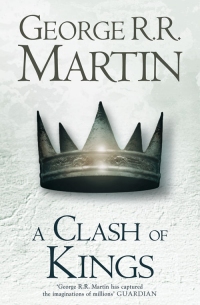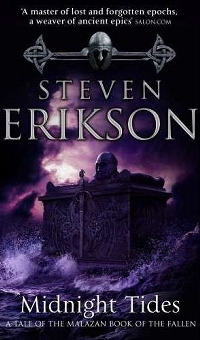I often try to pinpoint and understand certain things. One of these is about narrowing down the reasons why George RR Martin is immensely popular, and why his prose and style of writing feel so strong and vivid. I compare writers all the time, but not to decide who’s “better” and coming on top. I compare things because it lets me carve out stuff I’d otherwise miss. Because stacking things together lets me better appreciate in what and how they differ. So I constantly try to do this “gauging” of writing styles, but I lack the proper tools and knowledge to analyze a text, and so have to resort to my own vague, unspecified “feelings”.
 In the last few months I’ve deliberately juggled writers to juxtapose the most different styles. Jumping between Abercrombie, Glen Cook, Martin, Erikson, Donaldson, Gene Wolfe. And especially reading twenty pages of Erikson and then immediately moving to read twenty pages from Martin’s “A Clash of Kings” (that I’m reading also because I want to clear the book before the TV show starts), and the opposite, from Martin to Erikson. As I said, since I can’t analyze, I need this so I can understand how it “feels”. Because I believe there’s something quite relevant that I’m missing and so that is hard to describe.
In the last few months I’ve deliberately juggled writers to juxtapose the most different styles. Jumping between Abercrombie, Glen Cook, Martin, Erikson, Donaldson, Gene Wolfe. And especially reading twenty pages of Erikson and then immediately moving to read twenty pages from Martin’s “A Clash of Kings” (that I’m reading also because I want to clear the book before the TV show starts), and the opposite, from Martin to Erikson. As I said, since I can’t analyze, I need this so I can understand how it “feels”. Because I believe there’s something quite relevant that I’m missing and so that is hard to describe.
It’s important for me because it’s the opposite of “flattening” writers to a singular measure of quality. The comparisons I do are instead meant to “bring out” the differences so that I can better appreciate them.
What I found out is that moving from Erikson to Martin there is not so much to notice. It makes a kind of uneventful transition. I notice differences, obviously, but it’s not something that draws the attention. But if instead I do the opposite, reading Erikson after I’ve read Martin, the feeling is strong and I can only describe as: dismaying. It’s truly dismaying because this transition modifies the way I read Erikson. Suddenly I perceive something missing in Erikson’s prose that otherwise I wouldn’t notice. A strong feel. A gaping hole. After reading Martin, Erikson’s writing appears as barren and lacking. This is what I observed, but what I believe is important is the fact that all of this comes out only in one direction, but not in the other. From Martin to Erikson.
When trying to describe these feelings I thought that a good example retaining the quality of the comparison is about food. Martin’s way of writing is like a very rich meal. A banquet not unlike those described in the books. Bountiful and seducing. Going to read Erikson (notice that I’ll dramatize a lot to draw out these differences) is like being offered a plate of bones. You crunch noisily bones with your teeth and is not exactly as pleasant and gratifying (fulfilling) as sinking those teeth in juicy meat, grease dripping down your chin. It goes without saying that going from that kind of banquet to a plate of bones is definitely dismaying.
Looking into this I was wondering that the idea is also alike the writers themselves (at least what I see in pictures, since I’ve never met either). Martin himself has this charming, generous and bountiful, benevolent figure. While Erikson is wiry, a more nervous, withdrawn, angled figure. I’d say that if you put them side by side you’d notice Erikson definitely “missing” something (see where I’m going). It seems to me more than a mere coincidence that the way they are reflects so well in their respective writing styles.
 It’s an interesting observation because it consequently leads to something else. I believe that Martin writes in a style that is strongly “outward”. It’s what I notice the most in everything, from descriptions to characterization. Martin is colorful and explicit. He’s not “unsubtle”, since the characters have admirable depth, but it’s still a style of characterization that I define as outward. Reaching out, to expression and the reader. Spoken sincerely, but manifest and specific.
It’s an interesting observation because it consequently leads to something else. I believe that Martin writes in a style that is strongly “outward”. It’s what I notice the most in everything, from descriptions to characterization. Martin is colorful and explicit. He’s not “unsubtle”, since the characters have admirable depth, but it’s still a style of characterization that I define as outward. Reaching out, to expression and the reader. Spoken sincerely, but manifest and specific.
Where I’m going with this? I noticed that most of ASOIAF style of plot and intrigue, including character focus, is essentially the same of the gameplay of Crusader Kings 2. These big families seeking to secure powers, betrayal, fratricide, arranged marriages and so on. Thematic greed, selfishness, survival in a cage with wolves. Yet, don’t you notice? There’s a HUGE missing element in this particular recipe: religion. Crusader Kings 2 (as well the historical reality it is inspired to) is all about religion. It makes a significant axis that is curiously missing from ASOIAF. In Martin’s series there’s religion, but it makes a very superficial, immaterial layer holding no weight. Martin doesn’t seem really interested in it.
I’m writing all this because I believe it brings out a certain thing. Read this blog post by Scott Bakker, I think it explains well why my reactions above were one-directional only (from reading Martin to Erikson). Both writers have a style of writing that on its own feels “sufficient”. Maybe Erikson’s style isn’t so warm and welcoming, but whether you like it or not you don’t feel like there’s something that is lacking. It’s sufficient, perfectly walled as meant to be. So is Martin. But if you pose one against the other then differences surface and become visible and significant. You may think that this was a consequent rationalization, but my thought actually went down this path in reverse. I suddenly noticed that the kind of characterization that Erikson was doing was also completely missing from Martin. It’s just not there. You can take out paragraphs of text and, even adjusted or rewritten, they just wouldn’t belong to Martin’s book. They are alien. It’s stuff completely missing.
So the whole deal is figuring out that Martin writes “outwardly”. Because Erikson is blatantly the opposite. He writes inwardly. They go in opposite directions. Realizing this made me discover a number of different aspects. Erikson’s plate of bones is the result of meticulous carving, as a writing research. It’s the result of that inward, personal path. Peeling of layers, like skin, then fat and muscle. I can make an effective comparison with the movie industry. Compare Hollywood, or western in general type of narration, that is “outward”, explicit and loud, very carefully driven to an effect, compare it with the “indie” or eastern style of narration. That is quite often feebler, more intimate, quiet and understated. Easy to blot. Martin’s style has the power of drawing you in regardless of your disposition. Eventually you’re won even if you weren’t fully willing. It’s like a movie that drags you in using competently all its devices. This is what “swallows” the big public, being (the public) so fickle and capricious, heterogeneous, and so hard to capture (and hold down) as a whole. Erikson is the opposite. Either you are “devout” to listen carefully, or it pushes further away if you try to stick to it even if it doesn’t immediately grab you. It’s almost hostile, uncompromising, unforgiving. It’s quite selective, which isn’t exactly a good thing for a book.
In the end it seems coming down to spirituality, which is why I pointed out how religion is absent from ASOIAF. Spirituality is about going inward, is the kind of personal journey. The interpolation of this model underlines many things. You can see outward and inward characterization, you can see how the world and things are described. In Martin’s story there’s always so much the characters have on their hands, that is immediate and tangible, that they never really stop to think. It’s interesting for example that Martin deals with “mystery” either in a classical way (folk tales and similar), or he gets quite clumsy and awkward. He fumbles whenever his characters aren’t earthly guys (and excels when they are). Whenever he steps out of his outward approach, he is less effective. The meal is rich and so you don’t notice if something’s missing, but this is an illusion created by abundance. If you know where to look, you’d notice certain “lacks”.
It’s again so similar to the recent discussions about consciousness. Moonlight versus bright, dominant sun. Midnight tides versus Kings. How the argument is not symmetric, and how the slanted vision makes you see things wrongly. Intuitively they are in that way, but intuition is often wrong. The same was my “feeling” moving between Martin, Erikson and back. Noticing how Martin conquered spaces, of attention, appreciation. Marching on uncontested. In this, similar to a western school of movies that are all projected out toward the public, to reach and draw the public in. Like the Oscars, or the Hugos, ideally meant as external, overreaching institutions of absolute judgement, closing down on everything. But then there’s this very manifest risk that the loud voice will completely overshadow the feebler ones. A problem of domination, of doing things “better”, more effectively. Flattened to a single path. Of seeing rising popularity to obscure everything else.
You have to listen carefully.


One Trackback/Pingback
[…] and feelings, but lacking a certain “outward” development (see how I described it here). Too much bone, not enough flesh. It’s too pared down to the essential, to characters […]